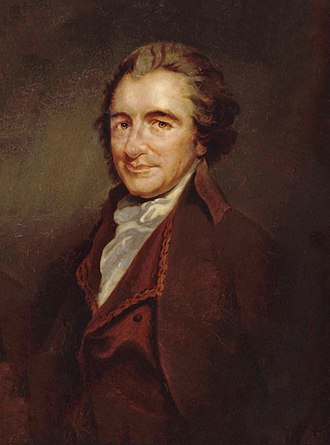Thomas Paine
Thomas Paine | |
|---|---|
 | |
| Era | 18th-century philosophy |
| Region | Western Philosophy |
| School | Enlightenment, Radicalism, Classical liberalism, Republicanism |
Main interests | Ethics, Politics |
Thomas Paine (29 January 1737 – 8 June 1809) was an English pamphleteer, revolutionary, inventor, and intellectual. Born in Norfolk, he lived and worked in Britain until he was 37, when he emigrated to the British American colonies during the American Revolution. His main contribution was the powerful, widely-read pamphlet Common Sense (1776). It promoted the idea of colonial America's independence from the United Kingdom of Great Britain. He also wrote The American Crisis (1776–1783), a pro-revolutionary pamphlet series.
Thomas Paine went to France after the American Revolution to join the French Revolution. He wrote The Age of Reason while in prison there. This pamphlet was critical of organized religion. Paine along with other American founders such as Thomas Jefferson and James Madison liked to apply reason to religion instead of revelation. This was part of the greater Age of Enlightenment movement that dated back to about the early 17th century. Paine died at the age of 72, at 59 Grove Street in Greenwich Village, New York City, on the morning of June 8, 1809.[1]
References
[change | change source]- ↑ "Thomas Paine". www.ushistory.org. Retrieved 2017-09-15.
Other websites
[change | change source]| Definitions from Wiktionary | |
| Media from Commons | |
| News stories from Wikinews | |
| Quotations from Wikiquote | |
| Source texts from Wikisource | |
| Textbooks from Wikibooks | |
| Learning resources from Wikiversity | |
- 1737 births
- 1809 deaths
- 18th-century American people
- 18th-century English writers
- 19th-century American people
- 19th-century English philosophers
- American deists
- American philosophers
- American revolutionaries
- English inventors
- Founding Fathers of the United States
- Naturalized citizens of the United States
- People from Norfolk